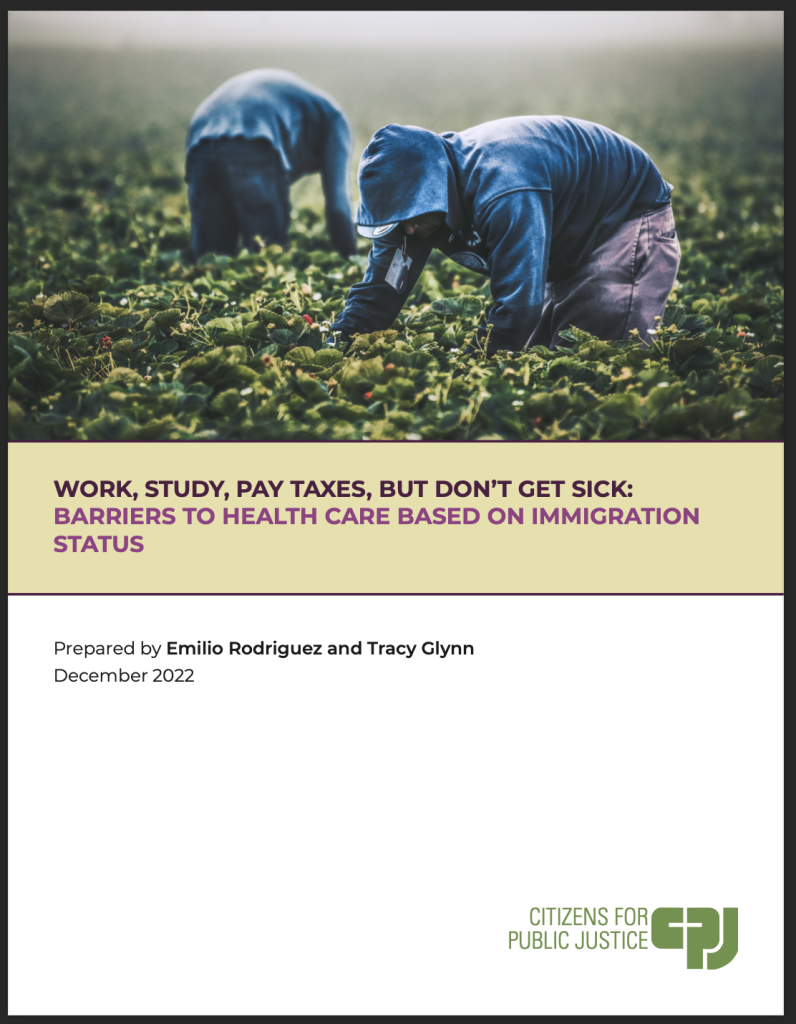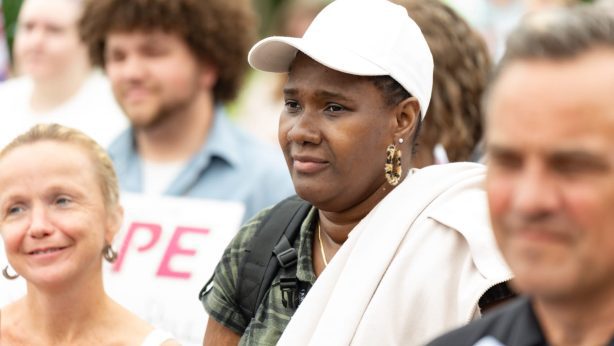Watch the launch of “Work, Study, Pay Taxes, But Don’t Get Sick: Barriers to Health Care Based on Immigration Status”
Migrant workers, refugees, international students and stateless residents are among those who struggle to access health care in Canada.
On December 7, the Canadian Health Coalition launched the Citizens for Public Justice report, “Work, Study, Pay Taxes, But Don’t Get Sick: Barriers to Health Care Based on Immigration in Canada,” in a webinar.
The report, co-authored by Emilio Rodriguez with Citizens for Public Justice and Tracy Glynn with the Canadian Health Coalition, calls on the provincial and federal governments to respect the Canada Health Act, including principles of universality, comprehensiveness and access, and remove barriers to health care access based on immigration status.
The webinar opened with a video of Kerian Burnett who was supposed to join the panel but due to her cancer treatments could not attend. In the video, Burnett speaks about her struggle to access treatments for cancer in Nova Scotia.
Burnett is a 42-year-old woman from Jamaica who came to Nova Scotia in April 2022 to work on a strawberry farm. The mother of six and grandmother of two fell ill soon after and was not able to work. In September 2022, she was diagnosed with cervical cancer, which required two surgeries. She was advised by her doctor to remain in Canada to undergo life-saving treatments.
In Nova Scotia, migrant workers must hold a one-year work permit to be eligible for public health care. Burnett is in Nova Scotia under the Seasonal Agricultural Workers Program (SAWP). Nova Scotia is among the provinces that have waiting periods to obtain a Medicare card. Since SAWP contracts are a maximum of eight months, workers are not able to access Medicare. Employers are required to provide private health insurance to workers not covered by Medicare.
“We’re part of the migrant-led movement for permanent immigration status for all migrants, which would enable all migrants in the country to have access to essential services like health care.”
STACEY GOMEZ, NO ONE IS ILLEGAL – NOVA SCOTIA, MIGRANT WORKERS PROGRAM
Burnett lost her private health insurance when her job ended due to her illness. Burnett is calling on Nova Scotia Health Minister Michelle Thomson to provide public health care coverage to herself and other migrant workers in Nova Scotia.
“There are lots of Jamaicans here and other migrant workers here, which they come here for work. Nobody wants to be sick, but eventually you get sick. Now we are working for like $13.35/hour. There is no way if you get sick, and you have a bill at the hospital, how are we going to pay these bills? So, actually, I’m not really doing this for myself alone. I’m doing this for every farmworker that doesn’t have access to public healthcare here in Canada,” said Burnett in the video.
“Denying public health coverage based on immigration status is not an accidental oversight, but a conscious decision embedded in Canadian public policy,” write report co-authors Rodriguez and Glynn.
For Rodriguez, the Canadian health care system is not truly universal because it bars hundreds of thousands of people from accessing health care based on their immigration status in the country. “We call for status for all… We’re also asking that in the meantime, as we achieve this change of getting permanent resident status for all migrants in the country, that provincial governments provide health care to all temporary residents based on tied to their employer or employment status.”
In the report, the story of Deepan Budlakoti is told as a way to describe the refusal of care for stateless, non-status people.
Budlakoti told the webinar audience that he lost his status and access to health care in 2009. A few years later, he suffered burns to 20 per cent of his body in an accident. “I was taken to the hospital and resided at that hospital for approximately nine days… I needed treatment. I needed medication. I needed follow-up care. All these processes were not covered in any way. I had to pay out-of-pocket. If I did not pay out-of-pocket, I was getting no services.”
Budlakoti describes the stressful situation he endured trying to get follow-up care. “It becomes a very stressful situation. You’re already injured. You’re already in a precarious vulnerable position. And then on top of that, you know dealing with medical problem,” said Budlakoti.
Stacey Gomez attended the panel in Burnett’s place to answer questions. Gomez coordinates the No One Is Illegal Nova Scotia Migrant Worker Program. For Gomez, Burnett’s struggle to access health care is not an isolated one.
“We regularly hear from workers who are facing health concerns and challenges being able to access health care because oftentimes they have to rely on their employer and the employer may not want to take them to get health care,” said Gomez.
The report calls for an end to medical repatriation, which Gomez highlighted as a concern in Nova Scotia. “If a worker has a health concern, the employer may want to quickly send them back if they have a workplace injury, instead of the worker being able to apply for workers compensation, they may just be sent back.” Burnett’s former employer tried to give her two flights back home but she refused to take them.
Gomez noted that private health care coverage is quite limited and not enough to cover the health care needs of workers who are injured or get sick.
“We’re part of the migrant-led movement for permanent immigration status for all migrants, which would enable all migrants in the country to have access to essential services like health care,” said Gomez.
The report, launched days before International Universal Health Coverage Day, debunks a number of myths including the notion that people come to Canada to engage in health tourism. Government lawyers accused Nell Toussaint of health tourism earlier this year in an attempt to block her claim that is seeking damages and access to health care for irregular migrants from proceeding in court. They were denied.
Described in the report is the case of Toussaint, a woman from Grenada who was denied health care because of her irregular immigration status. The Canadian Health Coalition has joined ten other human rights organizations as an intervenor in the case that is currently making its way through the courts.
Justice Paul Perell, presiding over the government motion to dismiss the case, found the government lawyers’ arguments perpetuated negative stereotypes of irregular migrants: “In a dog whistle argument that reeks of the prejudicial stereotype that immigrants come to Canada to milk the welfare system, Canada mischaracterizes Ms. Toussaint’s Charter claim as a right to receive free health care anywhere in the world regardless of one’s lack of status.”
For Rodriguez, health tourism is a myth and providing health care to all is “not a matter of charity, it’s a matter of justice.”
Support Kerian Burnett’s cancer treatments here.
Stay tuned for more webinars on timely health care topics by the Canadian Health Coalition in the new year.
Tracy Glynn is the National Director of Projects and Operations for the Canadian Health Coalition



